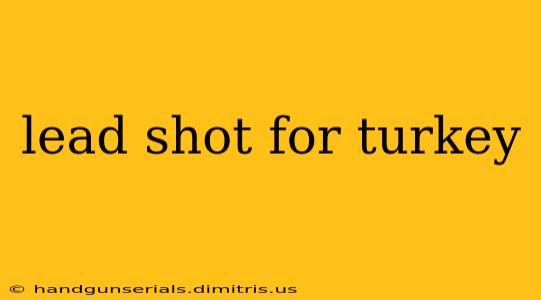Turkey hunting presents a unique challenge, demanding precision and ethical considerations. Choosing the right ammunition is paramount, and for many, that means understanding the nuances of lead shot. While lead shot's effectiveness is undeniable, its environmental impact necessitates careful consideration. This guide delves into the specifics of using lead shot for turkey hunting, weighing its pros and cons, and exploring alternatives.
The Effectiveness of Lead Shot for Turkey Hunting
Lead shot has long been a favorite among turkey hunters due to its density and consistent performance. Its higher density compared to other shot types, such as steel or bismuth, translates to greater penetration power, vital for cleanly harvesting birds. This is particularly important given the often-challenging shots encountered in turkey hunting, which can involve thick brush or longer ranges. The spherical shape of lead shot also ensures consistent patterns, leading to more predictable shot placement. For many experienced hunters, the proven reliability of lead shot is a key factor in their ammunition choice.
Advantages of Using Lead Shot:
- High Density: Leads to greater penetration, crucial for clean kills.
- Consistent Patterns: Produces predictable shot spread for accurate shooting.
- Proven Effectiveness: A long history of successful use in turkey hunting.
- Cost-Effective: Generally less expensive than non-toxic alternatives.
The Environmental Concerns Surrounding Lead Shot
Despite its effectiveness, the use of lead shot raises serious environmental concerns. Lead is a highly toxic heavy metal that persists in the environment, posing risks to wildlife and potentially entering the food chain. Birds, particularly waterfowl, are particularly vulnerable to lead poisoning from ingesting spent shot. This concern has led to restrictions and bans on lead shot in many areas, prompting the search for environmentally friendly alternatives.
Disadvantages of Using Lead Shot:
- Environmental Toxicity: Lead is a significant environmental pollutant.
- Potential for Lead Poisoning: Risks to wildlife and potentially humans through the food chain.
- Legal Restrictions: Growing number of areas restricting or banning lead shot use.
Legal Considerations and Alternatives to Lead Shot
Before using lead shot, it is absolutely crucial to check both federal and state regulations. Many jurisdictions have imposed restrictions or outright bans on lead shot, particularly near water bodies or for specific game species. Failure to comply with these regulations can lead to significant fines.
Fortunately, several non-toxic alternatives to lead shot are available, offering comparable performance without the environmental risks. These include:
Non-Toxic Alternatives:
- Steel Shot: A widely available and relatively affordable option, though it may require a different choke for optimal performance.
- Bismuth Shot: A denser alternative to steel, offering improved performance at longer ranges. However, it is typically more expensive than steel.
- Tungsten-Iron Shot: Extremely dense, delivering exceptional penetration and performance, but also the most expensive option.
Choosing the Right Shot Size for Turkey Hunting
Regardless of the shot material you choose, selecting the appropriate shot size is critical. The ideal shot size depends on several factors, including the distance to the target and the density of the shot material. Generally, smaller shot sizes (like #4, #5, or #6) are suitable for longer ranges, while larger shot sizes (like #2 or #4) are better for closer shots. Consult ammunition manufacturers' data for specific recommendations based on the shot type and your firearm.
Conclusion: Making an Informed Decision
The decision of whether or not to use lead shot for turkey hunting involves balancing effectiveness with environmental responsibility and legal compliance. While lead shot's proven performance is undeniable, the growing awareness of its environmental impact and the availability of effective alternatives encourage hunters to consider non-toxic options. By researching local regulations and understanding the benefits and drawbacks of each shot type, turkey hunters can make an informed choice that ensures a successful hunt while minimizing environmental impact.

